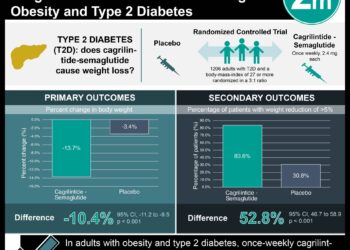Risk of gestational diabetes diagnosis significantly increased among individuals with high polygenic risk scores and low levels of physical activity
1. Patients with diabetes and high polygenic risk scores are at an increased risk of developing gestational diabetes.
2. Assessment of polygenic risk scores amongst high-risk patients may improve opportunity for early intervention for gestational diabetes.
Level of Evidence Rating: 2 (Good)
Study Rundown: Gestational diabetes is a common diagnosis during pregnancy which increases the risk of poor maternal and fetal outcomes. One of the strongest risk factors for gestational diabetes (GDM) is a previous diagnosis of diabetes mellitus. Previous work has identified genetic variants which increase the risk of diabetes and GDM, although it remains unclear how lifestyle factors such as level of physical activity interact with this model. The present study sought to understand how exercise and genetic risk for diabetes influence risk of GDM in nulliparous women in the United States.
A total of 3533 women were included in this study. Patients diagnosed with GDM had higher polygenic risk scores than women without a GDM diagnosis. High polygenic risk score was associated with increased risk of GDM diagnosis. Conversely, higher levels of physical activity were associated with reduced risk of GDM. Patients who demonstrated low levels of physical activity in early pregnancy were more likely to develop GDM eventually. The following factors were also associated with increased risk of GDM both independently, as well as in combination with low physical activity levels and high polygenic risk scores: maternal age over 35 and body mass index over 25.
This cohort study by Pagel et al provides evidence that low levels of physical activity in combination with genetic predisposition increase risk of gestational diabetes mellitus in nulliparous patients during their first pregnancy. This information may be useful in identifying patients at elevated risk of GDM and offering early intervention to avoid adverse maternal and fetal outcomes. A strength of this study is the large sample size and collection of data from multiple sources (i.e., genetic, clinical, self-reported). However, the results of this study may have limited generalizability due to the stringent inclusion criteria and should be interpreted with caution given that much of the data was self-reported by participants.
Click here to read this study in JAMA
Relevant reading: Risk factors for gestational diabetes: is prevention possible?
In Depth [prospective cohort]: This was a multicenter cohort study conducted in the United States. Patients were enrolled between 2010 and 2013 and followed throughout the duration of their pregnancy and at the time of delivery. Participants were selected from a larger study cohort and were included if they were pregnant, of White race and had no history of diabetes or prediabetes prior to the study. Patients self-reported their physical activity levels and activity was standardized into measurements of metabolic equivalents. Genotyping was performed using standardized methods and their corresponding risk score was calculated based on the frequency of high-risk alleles.
Women who developed GDM had a significantly higher polygenic risk score than those who did not: the mean risk score amongst patients with GDM was 8.49 (standard deviation 0.58) and was 8.25 (0.54) amongst patients without GDM (p<0.001). The odds of a GDM diagnosis increased with each patient’s polygenic risk score compared to the mean: in the second quartile the odds ratio was 1.1 (95% confidence interval 0.60-2.0), 1.8 (1.0-3.1) in the third quartile and 2.9 (1.7-4.8) in the fourth quartile. Patients with GDM had significantly higher odds of having the lowest level of physical activity early in their pregnancy (odds ratio 0.5, 95% confidence interval 0.3-0.8).
Amongst patients 35 years or older at the time of their first pregnancy, the odd ratio for GDM amongst those with high polygenic risk score was 5.1 (2.8-9.2) and for low physical activity level was 4.5 (2.5-7.9). Amongst patients with elevated body mass index over 25, the odds ratio for GMD amongst those with high polygenic risk score was 3.2 (2.1-4.7) and for those with low physical activity was 2.4 (1.7-3.6).
Image: PD
©2022 2 Minute Medicine, Inc. All rights reserved. No works may be reproduced without expressed written consent from 2 Minute Medicine, Inc. Inquire about licensing here. No article should be construed as medical advice and is not intended as such by the authors or by 2 Minute Medicine, Inc.









